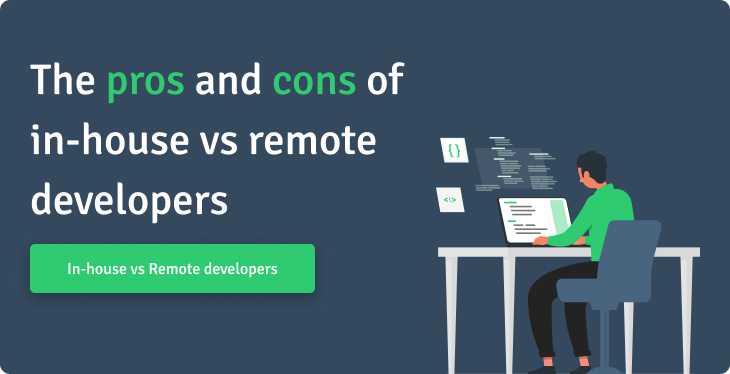The pros and cons of in-house vs remote developers
Hiring the right developers for your team is crucial for your project’s success. However, it is not easy to choose between hiring in-house or remote developers. Both have their own pros and cons, and it can be difficult to determine which one is best for your business.
In this article, we will discuss the pros and cons of hiring in-house developers versus remote developers.
In-house developers

Pros of Hiring In-House Developers
Face-to-Face Interaction:
When you hire in-house developers, you can work with them face-to-face. This makes communication easier and helps build strong relationships with your team.
Better Collaboration:
In-house developers can collaborate more effectively with other team members, which leads to better solutions and a more productive work environment.
Company Culture:
In-house developers are part of your company culture and share your values and goals. They are more invested in your business’s success and can work towards the same goals as you.
Cons of Hiring In-House Developers
Limited Talent Pool:
When you only hire in-house developers, you are limited to the talent pool in your local area. This can make it difficult to find the right developers for your team.
High Costs:
Hiring in-house developers can be expensive, as you have to pay for their salaries, benefits, and office space.
Limited Flexibility:
In-house developers are limited to working from your office, which limits their flexibility and work-life balance.
Remote developers

Pros of hiring remote developers
Larger Talent Pool:
Hiring remote developers gives you access to a larger talent pool, as you can hire developers from all over the world. You’ll be able to find developers with the right skills and experience.
Lower Costs:
Hiring remote developers can be more cost-effective, as you don’t have to pay for office space and other expenses associated with in-house developers.
Increased Flexibility:
Remote developers can work from anywhere, giving them more flexibility and a work-life balance. This can lead to increased job satisfaction and better work performance.
Cons of hiring remote developers
Communication Challenges:
Remote developers may have different working hours and time zones, which makes communication harder. This can cause delays and misunderstandings.
Limited Collaboration:
Remote developers may have a difficult time collaborating with other team members, which can lead to a less cohesive team and potentially lower productivity.
Trust Issues:
It can be difficult to build trust with remote developers, especially if they are in a different country or culture. This can lead to difficulties managing their work and ensuring expectations.
Conclusion
In-house developers and remote developers both have their own pros and cons, and the decision of which one to hire depends on the specific needs of your business. Consider factors such as your budget, project timeline, and skills and experience when making your decision.
No matter which option you choose, it is critical to communicate clearly with your team and build a strong working relationship. This will ensure your project’s success.


